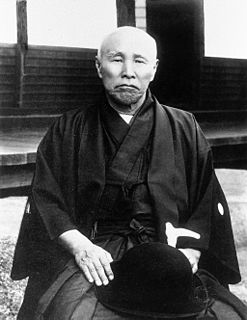
Marquess Ōkuma Shigenobu was a Japanese statesman and a prominent member of the Meiji oligarchy. He served as Prime Minister of the Empire of Japan in 1898 and from 1914 to 1916. Ōkuma was also an early advocate of Western science and culture in Japan, and founder of Waseda University. He is considered a centrist.
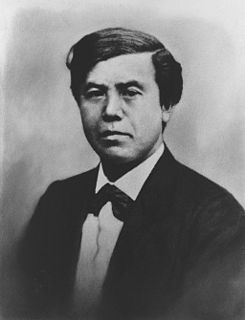
Kido Takayoshi, also referred to as Kido Kōin, was a Japanese statesman of the Meiji Restoration. He was known as Katsura Kogorō during the late Tokugawa period. He is considered as one of the three great nobles who led the Restoration.
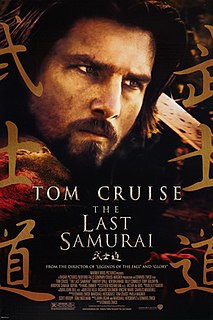
The Last Samurai is a 2003 American period action drama film directed and co-produced by Edward Zwick, who also co-wrote the screenplay with John Logan and Marshall Herskovitz. The film stars Tom Cruise, who also co-produced, with Timothy Spall, Ken Watanabe, Billy Connolly, Tony Goldwyn, Hiroyuki Sanada, Koyuki, and Shin Koyamada in supporting roles.

MarquisKōichi Kido served as Lord Keeper of the Privy Seal of Japan from 1940 to 1945, and was the closest advisor to Emperor Hirohito throughout World War II. He was convicted of war crimes and sentenced to life imprisonment, of which he served 6 years before being released in 1953.
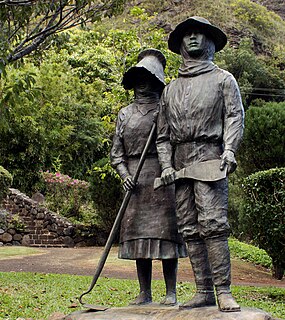
The Japanese in Hawaii are the second largest ethnic group in Hawaii. At their height in 1920, they constituted 43% of Hawaii's population. They now number about 16.7% of the islands' population, according to the 2000 U.S. Census. The U.S. Census categorizes mixed-race individuals separately, so the proportion of people with some Japanese ancestry is likely much larger.
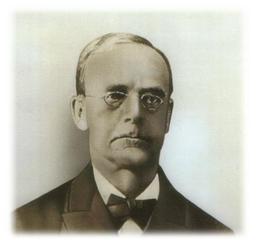
Guido Herman Fridolin Verbeck was a Dutch political advisor, educator, and missionary active in Bakumatsu and Meiji period Japan. He was one of the most important foreign advisors serving the Meiji government and contributed to many major government decisions during the early years of the reign of Emperor Meiji.

Julius Karl Scriba was a German surgeon serving as a foreign advisor in Meiji period Japan, where he was an important contributor to the development of Western medicine in Japan.

Ludwig Riess was a German-born historian and educator, noted for his work in late 19th century Japan.

Education in the Empire of Japan was a high priority for the government, as the leadership of the early Meiji government realized the need for universal public education in its drive to modernize Japan.

Takamine Hideo was an administrator and educator in Meiji period Japan.

Antonio Fontanesi was an Italian painter who lived in Meiji period Japan between 1876 and 1878. He introduced European oil painting techniques to Japan, and exerted a significant role in the development of modern Japanese yōga painting. He is known for his works in the romantic style of the French Barbizon school.

Luther Whiting Mason was an American music educator who was hired by the Meiji period government of Japan as a foreign advisor to introduce Western classical music into the Japanese educational curriculum.
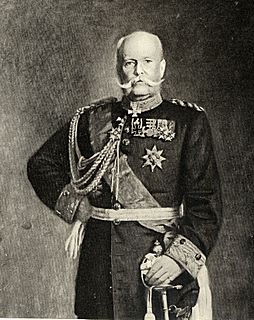
Klemens Wilhelm Jacob Meckel was a general in the Prussian army and foreign advisor to the government of Meiji period Japan.
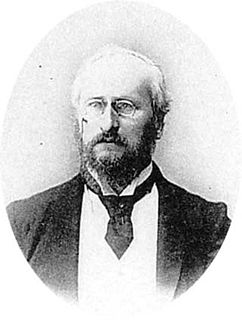
Charles Dickinson West was an Irish mechanical engineer and naval architect, who worked for many years at the Imperial College of Engineering, in Meiji era Japan.
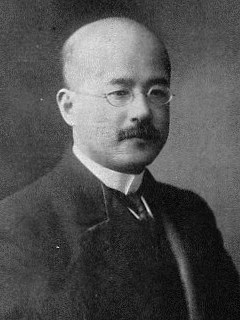
Count Hideo Kodama, was a politician, and wartime cabinet minister in the Empire of Japan. He was the eldest son of famed Russo-Japanese War general Kodama Gentarō, and his wife was the daughter of Prime Minister Terauchi Masatake.

Emperor Meiji, also called Meiji the Great, or Meiji the Good, was the 122nd Emperor of Japan according to the traditional order of succession, reigning from 3 February 1867 until his death on 30 July 1912, and the first monarch of the Empire of Japan. He presided over the Meiji era, a time of rapid change that witnessed Japan's transformation from an isolationist, feudal state to an industrialized world power.

Takahashi Yuichi was a Japanese painter, noted for his pioneering work in developing the yōga (Western-style) art movement in late 19th-century Japanese painting.
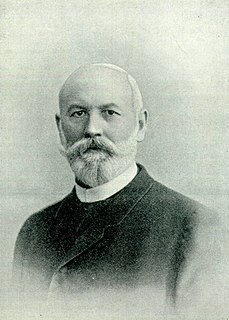
Wilhelm Böckmann was a German architect who worked briefly as a foreign advisor to the government of Meiji period Japan.

Shigeo Ōdachi was a bureaucrat, politician and cabinet minister in both early Shōwa period Japan and in the post-war era.

Sengaku Mayeda is a Japanese writer, philosopher and teacher, known for his writings on Indian philosophy and Adi Shankara. He was honoured by the Government of India, in 2014, by bestowing on him the Padma Shri, the fourth highest civilian award, for his services to the fields of literature and education. He is the fourth Japanese to be honoured with Padma Shri, after Taro Nakayama, Shoji Shiba and Prof. Noboru Karashima. He is also a recipient of the Third Order of Merit with the Middle Cordon of the Rising Sun of the Government of Japan, which he received in 2002.




















